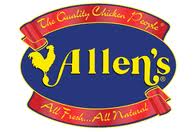 Right before filing Chapter 11 bankruptcy, Allen Family Foods was on the brink of collapse. The company’s major bank, with whom it also held payroll services, called in their loans and left many workers unpaid.
Right before filing Chapter 11 bankruptcy, Allen Family Foods was on the brink of collapse. The company’s major bank, with whom it also held payroll services, called in their loans and left many workers unpaid.The payroll issues arose after the bank where Allen keeps its payroll account, Wilmington Trust, sent Allen a default notice and demanded payment on more than $520,000 in loans in late May, as the company was pursuing a sale, according to court filings.
“We got all tangled up in that because Wilmington Trust … got a little nervous,” said Turley, adding that Allen has resumed normal payroll activities with the approval of a U.S. bankruptcy judge in Wilmington. “They were trying to work through the issues just like we were. They were concerned like we were. They’re going to be with us until the end.”
But what exactly went wrong? While the details of why the company ran into financial trouble aren’t presently clear, it is clear that the company waited until it nearly flat-lined before seeking the protection of bankruptcy. Because of this delay, not only did the fate of the business suffer; but also the livelihoods of its 1600 employees who are currently in jeopardy.
When it comes to filing bankruptcy, the process should not be treated as something that is a last-resort as so many bankruptcy opponents suggest. Bankruptcy should be treated as a tool to help a company carefully reorganize their debts or liquidate their company if necessary. Bankruptcy should be used to avoid the kind of chaos that results in bounced payroll checks. This is why it is critical that troubled businesses take an honest look at their finances and ask themselves —“Should we consider our bankruptcy options now?”